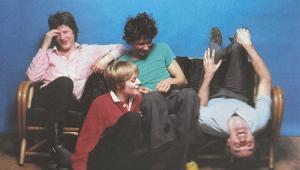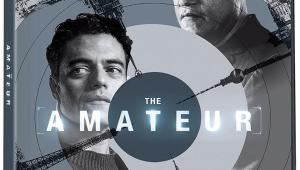No Problem Page 3
The Problem Hey! Congratulations! Your bookcase o' discs is mighty impressive. What are we looking at here? Maybe a thousand CDs and 500 DVDs? A monster collection like that must be a tremendous joy - except, of course, when you actually want to find something. You can alphabetize them, use the Dewey Decimal System, or any other scheme, but that one CD might be in your wife's car, your kid's boombox, or your toddler's mouth. Speaking of 2-year-olds, I know one who passionately loves to rearrange shiny discs into an ordering that only his secret genius can fathom. The fact is, the bigger the forest, the harder it is to find a certain tree.
The Solution Throw away all your discs, of course. Whoa! Wait a second - let me explain. In other words, move all that precious entertainment to a server. That's not as scary as it sounds. I'm not suggesting that you call IBM and have a mainframe installed in your living room. Servers can be a PC, a dedicated box with a big hard-disk drive, or as simple as an iPod. Whichever way you go, you'd be transforming that brimming collection of discs into an easy-to-manage collection of digital files. So instead of a wall of CDs and DVDs, you'd have a hard drive loaded with your favorite music and movies. (Of course, most folks will hang onto their discs for archival purposes or at least back up their newly minted electronic collection on a secondary drive.)
The advantages of file storage are compelling. For starters, apart from the server itself, files don't take up any space. And you can organize and classify to your heart's content without ever touching a CD or DVD, build playlists for any occasion, and find any song you want in a matter of seconds. No more hunting for missing discs in the kids' rooms or under a car seat. (Sure, you can do that with a CD or DVD megachanger, but it's easier and faster with a server.) Last but not least, you'll be able to set up a wired or wireless network around your server that lets you access your collection from anywhere in the house.
So, a server is the clear winner, right? Well, that depends on what you want to use it for. Music can eat up a decent amount of disk space but video takes up more - a lot more. With modest data compression that doesn't compromise sound quality, you can fit 1,000 CDs on a reasonably priced server, but several hundred DVDs copied without additional compression will require a much bigger investment in drive capacity and might raise some legal questions. For example, Hollywood is challenging the legality of movie servers like the Kaleidescape (February/March 2004) that let you store copies of your DVDs on a huge hard drive.
Still, manufacturers are hotly pursing this new market. We've reviewed a number of servers. For example, Yamaha's MusicCAST (September 2003) has a CD drive, an 80-GB hard drive, and Wi-Fi to send music wirelessly throughout your house. The Escient DVDM-300 (June 2005) ups the ante, ripping CDs to its 300-GB hard drive and controlling up to three DVD/CD changers. And the awesome Xperinet Polaris (June 2005) can deliver up to seven streams of movies from its 1.25 terabytes of storage. That's just the beginning.
Looking Ahead To serve or not to serve? If you're a trendsetter, a server is the way to go. It's simply more elegant and convenient than discs. And as prices come down, servers will proliferate. Look for an explosion of fully integrated systems that can acquire, store, organize, and distribute all your entertainment assets. As we break the habit of buying and playing discs or copying them to memory, we'll skip the disc part and just buy files to store on home servers. It's possible we'll eventually skip personal storage altogether in favor of on-demand delivery from some huge central server. Either way, whether it's in your home or hidden in a silo in North Dakota, the advantages of a server make it the bookcase of the future.





























































